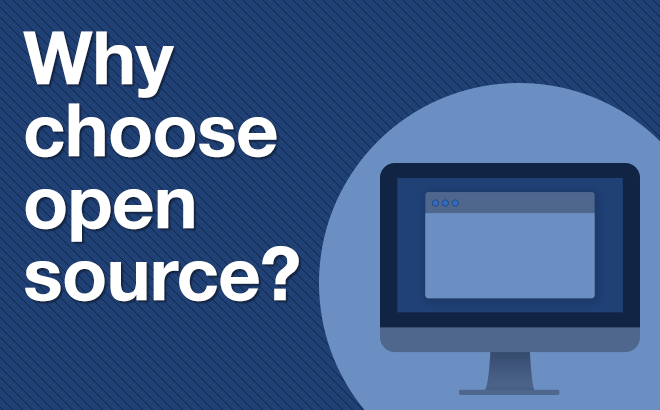The benefits of using open source software

As a digital agency, we are often asked how we decide which technology to use when developing our websites. There are two main categories of software available for developers, open source and proprietary, and typically web developers will have a preference between the two. At Cite, we consider ourselves an open source agency because of the many advantages open source technology has for developers and clients. To help you find out why we prefer open source, our web developers have put together a list of the benefits of using open source technology.
Open source software is software that is created by a community of developers so that it can be freely used, changed, and shared by anyone. Its authors make the source code available to others who would like to view that code, copy it, learn from it, alter it, or share it. Open source technology includes programming technology like Linux and MySQL through to popular Content Management Systems like WordPress and Joomla. Proprietary software, on the other hand, is software that is owned by an individual or a company, has restrictions on how it can be used, and its source code is almost always kept secret. Microsoft Windows is an example of proprietary software and Microsoft.NET is a programming technology for building applications that is made for the Windows operating system.
To help you decide if open source is the right technology for you, here are nine benefits of using open source software:
- Security: Some people argue that open source software is more secure and stable than proprietary software. As anyone can view and modify open source software, a worldwide community of developers are regularly finding and correcting errors that a program’s original authors might have missed. Also, because no permission from the original authors is needed, open source software is generally fixed, updated, and upgraded quickly. Proprietary software, on the other hand, tends to be slower in releasing security updates because of the formal process it must go through.
- Freedom: When businesses turn to open source software, they free themselves from the restrictions of proprietary packages. Proprietary software users are at the mercy of the vendor’s vision, requirements, and prices, and that limits what they can do with the software they’re paying for. With open source software, users are in control to make their own decisions and to do what they want with the software. They also have a network of developers around the world to help with those goals.
- Cost: In many instances, open source software can be used for free, whereas propriety software cannot. Costs associated with propriety software include licensing costs, the cost of mandatory virus protection, ongoing upgrade expenses and the costs associated with being locked in. As a result proprietary software is much more expensive than open source software.
- Maintenance: Using proprietary software such as Microsoft Windows requires you to keep upgrading both software and hardware. Open source software, on the other hand, is typically much less resource-intensive, meaning that you can run it well even on older hardware. Ultimately you get to decide when it’s time to upgrade.
- Flexibility: Most open source CMS’s have a variety of plugins created by the community of web developers. These enable customisation and help tailor a website to meet your needs. These plugins also save on development time, which in turn saves you money and hassle.
- Control: Open source software is very easy to control. Programmers can examine the code to make sure it is doing what they want, and can change parts of it they don’t like. Proprietary software does not allow for this level of control.
- Auditability: With propriety software you are relying on the vendor telling you that they’re keeping the software secure and adhering to standards. However, the visibility of the code behind open source software means that you can check it for yourself and be confident that your site is secure.
- No dependency: Open source software is not dependent on the company or author that originally created it. Even if the company fails, the code will continue to exist and be developed by its users. Similarly, if your website is built with open source technology, it is much easier to move it from one digital agency to another than if it was built using proprietary software.
- No licensing issues: Companies using open-source software do not have to think about complex licensing models. Since anyone can use the software, there are very few restrictions on its use and little need to protect it with anti-piracy measures like a product activation or serial number.
While open source technology does meet the requirements for many websites, it is not always the best option. In some instances proprietary software is a better solution, particularly if you require enterprise-grade support and professional vendor services. Nevertheless, the majority of websites do not have such specific requirements, and for these we believe that open source software is the best technology to use. We aren’t alone, and because of its high popularity there is now an open source solution for virtually all proprietary software.
Are you looking for a web developer?
If you are looking to create a website for your business, please call our developers on 0116 254 9888.



